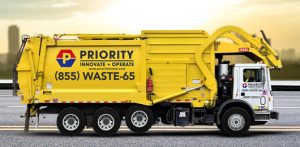By Epiphany Communications: Coaching & Consulting 
Todd Stamper was just 8 years old when his entrepreneurial journey began. Local children on the beaches of Cancun selling chicklet gum during a family trip triggered Stamper’s business mind. The following year, the family returned to Cancun and Stamper packed cassette players and cassette tapes of musicians on the top 40 charts like Michael Jackson and Madonna.
“I went to the beach and sold everything I brought with me,” he said. “I was selling something they didn’t have in Cancun.”
That business growth mindset continued as Stamper grew older and eventually, he became the founder and CEO of Priority Waste, one of MIRA’s newest members. The business was born out of a vision to redefine waste management, sustainability, and logistic practices.
In 2018, Stamper along with a group of passionate individuals with extensive industry experience came together, driven by a shared goal to create a company that would define their vision. They went from a four-truck company and a handful of employees to 600 trucks and 750 employees in six years.
Looking for opportunities to expand his business and increase profits has always been part of Stamper’s business mindset.
At 13 years old, he started to subcontract his paper route business to other kids in the neighborhood who were not old enough to have a paper route. “I was taking a 20% cut and I didn’t even know that what I was doing was subcontracting or that I was taking a percentage as a business owner, hiring other kids to handle my route.”
Barely in high school, he was earning $1,000 a week from his paper route.
At 18 years old, Stamper had saved enough money to start a carpentry business which he named Quest. “A local inspector would stop by our construction sites and show us how to frame homes,” he said. “We eventually got to the point we were able to frame a home within 48 hours.”
He owned and operated Quest until 2008 when the market took a hit.
“As far as the garbage industry stands, it was so archaic when we got into it,” said Stamper. “I was managing auto parts plants, and the local garbage company was not picking up the garbage on time. We had garbage sitting on the dock. We had auto plants all over the world. I originally got into the waste management company just to service our auto plants.”
This year, Priority Waste is acquiring an existing waste management company which will expand the company’s footprint into other states.
 With advanced technology, including artificial intelligence (AI), Stamper has been able to create a company that offers true transparency. “We used to have a high turnover of employees and industry-wide, there were lots of angry employees and dissatisfied customers,” he said. “We’ve changed that.”
With advanced technology, including artificial intelligence (AI), Stamper has been able to create a company that offers true transparency. “We used to have a high turnover of employees and industry-wide, there were lots of angry employees and dissatisfied customers,” he said. “We’ve changed that.”
While most companies install cameras in service trucks to focus on employee theft, accountability of work hours, and accuracy at stops, Stamper expanded on the benefits of cameras and computers in cars. “Each driver is assigned a logistic driver coordinator (LDC) who is in contact with drivers in real-time throughout the day,” noted Stamper who created the software for his logistic system. Priority Integrated Technology (PIT) is the computer system that enables drivers to communicate with their point person back at the office. It’s much like the video displays in Tesla cars.
Back at the corporate office in Clinton Township, Michigan, there is an impressive room with a digital display wall for all cameras running across 64 feet and standing at 9 feet high, watching every truck in every community that Priority Waste serves.
The system allows mechanics on site to fix problems while being consulted by a mechanic back in the office who with the cameras, can assess the situation. It’s like using Facetime on an iPhone. “An LDC watching the city Taylor for instance can see everything the truck driver is doing,” said Stamper. “AI tells our drivers if they missed a house or if a customer paid for bulk pick up. AI will even alert our drivers if there are too many bulk items. Our trucks will only pick up the allowed two bulk items and leave any extra bulk items behind.”
A missed house costs the company $135 for a driver to go back and pick up the garbage, “so our systems have made our drivers more efficient and our company more cost-effective,” said Stamper.
The technology also assesses recycled garbage and non-recyclables and if they are being placed in the wrong bins. “We can show our clients how they can save money in the long term if they recycle properly. We are focused on transparency at every level. The computers don’t lie. They can see what was picked up, at what time, and from where. If a customer claims a driver missed a spot, our cameras will record it.”
Stamper’s technology has produced secondary benefits. “Our Cameras have picked up robberies, break-ins, drunk drivers, and accidents,” said Stamper. “It’s a passive relationship. We are not in the police business, but if the police ask for our footage, we will hand it over.”
Stamper also understands the needs of MIRA members. As the founder and owner of Stamper Facility Management (SFM), he contracts with other industries such as HVAC and other vendors. “That experience has helped me become a better leader,” he said. “I understand the needs of other businesses, especially MIRA members.”
The AI cameras can show how much trash is being tossed into member dumpsters. “We know that MIRA members are working hard to turn a profit and to be efficient in their businesses. Our level of transparency helps them track their waste management and recycling end of their business.”
Stamper and his wife have three adult children and are expecting their first grandchild. Their son is finishing medical school this year, specializing in orthopedics. His daughter is at Dartmouth University as a Division 1 hockey player and their youngest daughter is a senior at Cranbrook High School and plays hockey too. She will also most likely follow in her dad’s entrepreneurial footsteps.
“When she was just 9 years old, my wife and I noticed she was buying squishy toys on Amazon and turning around and selling them for $10. The only thing was she was using our money to buy them, so she created a 100% profit!”
Now that they are no longer running around chasing kids, Stamper and his wife enjoy traveling, golf, pickle ball, and hanging out with the family. “We take a lot of weekend trips to the West Coast and Florida.”
The couple of also very philanthropic. “While my wife is very passionate about working with seniors, I am more focused on kids, especially those overcoming an addiction,” said Stamper. “Addicts are highly intelligent. If we can get them to transfer their skills from searching for drugs to something more productive, they could be successful.”
Stamper credits his ambition and strong work ethic to both his grandfather and father and to his friends growing up whose families owned convenience stores. “I would work at their family businesses so I could hang out with my buddies. Their parents paid me to bag groceries or stock shelves, and I would get to see how hard my friends worked. They saw first-hand what it takes to pay bills and buy things the parents bought for their kids.”
That work ethic has resulted in rapid growth, the creation of advanced technology, a 99.987% success rate in garbage pickup, and client satisfaction. “Our relationship with MIRA is such a natural fit,” said Stamper. “I grew up in the retail industry working for my friends’ families. Priority can offer an affordable waste management solution for all MIRA members, regardless of size. I am looking forward to building upon that history with MIRA members.”
Priority Waste has a MIRA Endorsed Program that all members are eligible to participate in. To learn more about the program contact MIRA at (248)671-9600, visit www.miramw.org, or check out www.prioritywaste.com.



